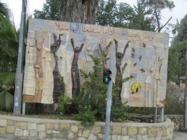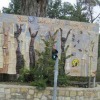
If I were the freshly re-elected prime minister of the State of Israel or the re-elected president of the United States, I would pay attention to a lovely piece of public art in downtown Ramallah. It features the ethos of a reformed Palestinian society.
The bas-relief shows embossed figures of men and women, their arms extended upwards. Above them is a famous quote from Mahmoud Darwish, the Palestinian national poet, which he wrote in 2000 at the beginning of the second intifada. It says: "And we love life whenever we can find a way to it."
The Palestinian Authority commissioned the sculpture to encourage and celebrate the state-building spirit under its rule in the West Bank.
In recent years, President Mahmoud Abbas and Prime Minister Salam Fayyad have been leading a transformation of the West Bank's economy, government, security apparatus, civil service, and a subsequent change in the spirit of the West Bank's Palestinian society. Having covered the West Bank as a journalist during the first and second intifadas, I remember well the norms and values that used to characterize this society. Twice it experienced the gradual transformation from resistance to depression and defeat, followed by hope, which generated economic development, entrepreneurship and a cultural renaissance.
The second time around, under Abbas and Fayyad, West Bank Palestinians have been focusing on construction, on reform and on establishing the infrastructure of a future state, including in the field of security, which is so important to Israel. To the satisfaction of Israel's top brass, the Palestinian Authority has trained and deployed thousands of professional security officers who cooperate with the IDF in fighting terrorists. Budding statehood and cooperation with Israel fueled international goodwill and provided the foundation for Western and Arab aid.
All this is now on the verge of collapse.
With no political horizon, faced with a political rival, Hamas, that is increasingly gaining power and influence both at home and internationally, faced with more Israeli settlement construction and less funding from Arab allies, the Palestinian Authority has little to offer. Sure, it still delivers services and boasts its successful bid to upgrade the Palestinian status at the United Nations, but it can't offer real hope for a peaceful, diplomatic resolution of the conflict with Israel, its chief political platform.
The PLO and its nemesis, Hamas, share much of the blame for the miserable state of the PA. But the key to reviving the PA and avoiding disastrous consequences are in the hands of Israeli Prime Minister Benjamin Netanyahu and President Obama. Only a meaningful diplomatic process could save the West Bank from falling into the hands of violent militants, and only Netanyahu and Obama can generate such a process.
The beginning of the unraveling of the PA is already visible. Palestinian political violence -- directed at Israel but at times also at the PA -- is up. Arab funding is dwindling. The PA, which is the West Bank's chief employer, has been struggling to pay salaries to government employees. Political support for the PA is down, and support for Hamas has increased. In a recent poll, Palestinians in the West Bank and Gaza Strip were asked whose way is the best to end the Israeli occupation and build a Palestinian state. Sixty percent preferred Hamas' way, a reversal of past patterns.
It's not too late to reverse this trend. Netanyahu will probably continue to balk. But a re-elected, determined Obama, backed by the American people, must not hesitate to lead an initiative to do what is in America's national security interest and what is the only way to provide Israel with a dignified future as both a Jewish state and a democracy.
Today, saving the Palestinian moderates, for the sake of a future Palestine, is the only way to save Israel.
Doing so, first and foremost, is in the hands of President Obama.
This article first appeared on jweekly.com on February 7, 2013
